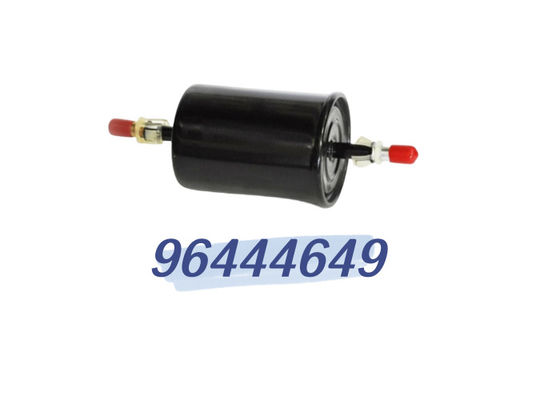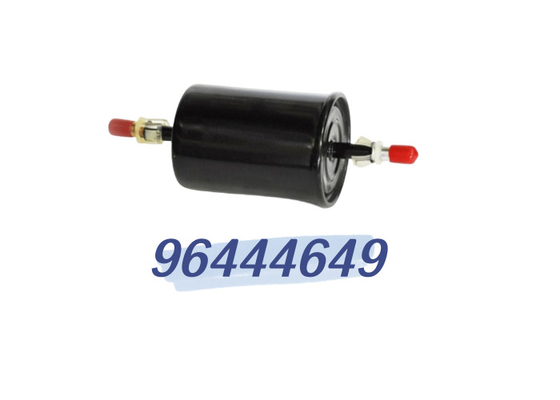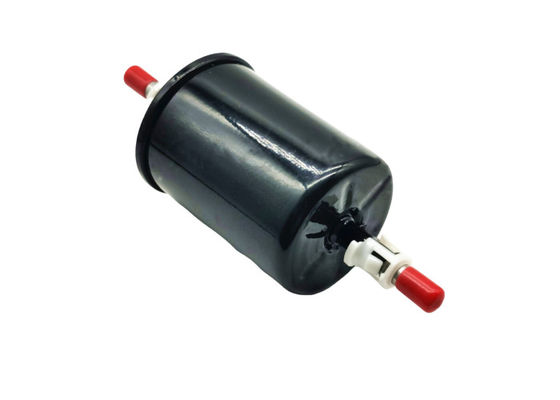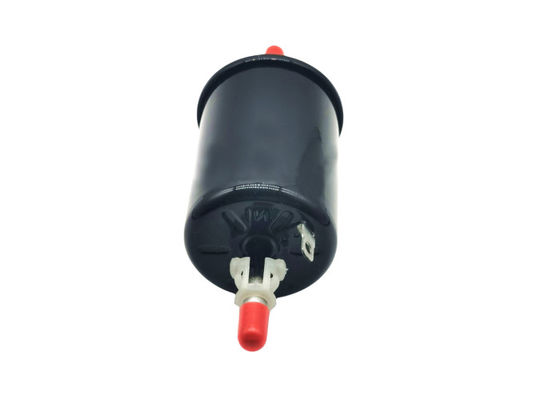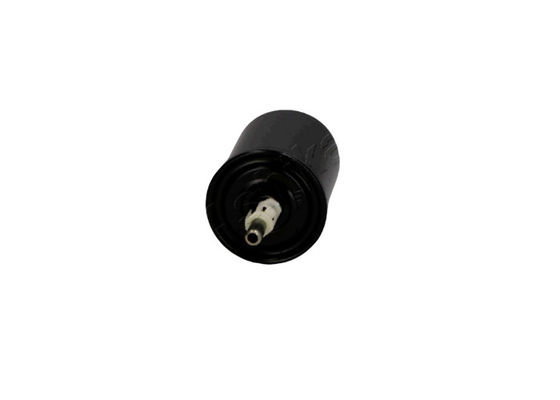Product Description:
A fuel filter is an essential component of an automotive fuel system, with its primary purpose being to protect the engine from any pollutants and impurities in the fuel. It is typically located between the fuel tank and the engine, in the fuel line.
The construction of a fuel filter typically consists of a cylindrical or rectangular housing with both an inlet and an outlet. Inside, there is a filter element made from materials like paper, fabric, or synthetic media, designed to trap particles like dirt, rust, and debris.
As fuel passes through the filter, the element collects and holds all the contaminants so that only clean fuel will continue on to the engine. This prevents any of these particles from entering the components like fuel injectors or carburetors, potentially damaging them or reducing efficiency.
As time goes on, the filter will become clogged or restricted as more and more contaminants are accumulated, causing issues like decreased fuel flow, engine efficiency reduction, and even engine problems. For this reason, regular fuel filter maintenance or replacement is required to keep the fuel system performing at peak condition.
Due to the wide variety of makes and models, fuel filters come in countless shapes, sizes, and designs. Further, some of them are disposable and need to be changed every so often, while others allow for cleaning and reuse by removing the collected impurities.
To conclude, a fuel filter is a necessary automotive part that guarantees fuel purity by trapping and holding contaminants and pollutants, providing efficient engine operation and safeguarding its components.
Applications:
The fuel filter plays a crucial role in the proper functioning of a vehicle's fuel system. Its important role can be summarized as follows:
1,Contaminant Removal: The primary function of a fuel filter is to remove contaminants and impurities from the fuel before it reaches the engine. Fuel can contain particles such as dirt, rust, debris, and even small contaminants from the fuel tank. The fuel filter's main job is to trap and prevent these contaminants from entering the engine, where they can cause damage or affect performance.
2,Engine Protection: By preventing contaminants from reaching the engine, the fuel filter helps protect critical engine components like fuel injectors, carburetors, and other fuel system parts. These components are designed to operate with clean fuel and can be sensitive to particles or debris. A fuel filter ensures that only clean fuel passes through, reducing the risk of damage or blockages in these components.
3,Fuel System Longevity: A clean fuel system is essential for the long-term health and longevity of the vehicle's fuel system. The fuel filter plays a vital role in maintaining the cleanliness of the fuel system by capturing and removing impurities. By doing so, it helps prevent fuel system clogs, corrosion, and premature wear, which can lead to expensive repairs or replacements.
4,Performance Optimization: A clogged or inefficient fuel filter can restrict the flow of fuel to the engine, affecting its performance. By ensuring a steady supply of clean fuel, the fuel filter helps optimize engine performance, delivering the right amount of fuel for combustion. This leads to smoother acceleration, improved power output, and overall better fuel efficiency.
5,Maintenance and Cost Reduction: Regularly servicing or replacing the fuel filter is a cost-effective maintenance practice. By keeping the fuel filter clean and functional, you can prevent potential issues caused by contaminated fuel, such as engine problems, fuel system repairs, or decreased fuel efficiency. Regular maintenance of the fuel filter can help avoid more significant expenses down the line.
Basic Data:
| Model NO. |
96444649 |
Type: |
Hydraulic Fuel Filter |
| Material: |
Paper Core |
Structure: |
Cartridge Filter |
| Filtration Grade: |
Hepa Filter |
Pattern: |
Dry |
| Application |
Liquid |
Brand |
Customized |
| Warranty: |
10000 Km |
Origin |
China |
| Specification |
59.5*160(mm) |
Production Capacity |
100000pieces/Year |
| HS Code |
8421230000 |
Applicable models |
Buick,Chevrolet |
How often is it necessary to install a new fuel filter:
The recommended replacement interval for a fuel filter can vary depending on the vehicle's make, model, and the manufacturer's guidelines. It is best to consult the owner's manual or contact the vehicle manufacturer for specific recommendations for your particular vehicle. However, as a general guideline, here are some factors to consider:
Manufacturer's Recommendations: The manufacturer often provides a recommended replacement interval for the fuel filter. This information can be found in the owner's manual or maintenance schedule. Following the manufacturer's guidelines is typically the most accurate and reliable source of information.
Driving Conditions: The driving conditions can impact the lifespan of the fuel filter. If you frequently drive in dusty or dirty environments, or if you regularly encounter poor fuel quality, the fuel filter may become clogged more quickly. In such cases, it may be necessary to replace the fuel filter more frequently.
Symptoms or Issues: If you experience symptoms of a clogged fuel filter, such as engine hesitation, decreased performance, or difficulty starting, it may indicate that the fuel filter needs to be replaced. In such cases, it is recommended to have the fuel filter inspected and replaced if necessary, regardless of the mileage or time interval.
Maintenance Schedule: Some manufacturers include fuel filter replacement as part of the regular maintenance schedule, typically performed during major service intervals. For example, it may be recommended to replace the fuel filter every 30,000 to 50,000 miles (48,000 to 80,000 kilometers), or every two to three years, whichever comes first.
Other Hot Selling Product

Packing and Shipping:
Packaging and Shipping for Automotive Fuel Filters
Automotive fuel filters are packaged in protective, moisture-resistant bubble wrap and placed in a cardboard box or other suitable shipping container. The box should be clearly labeled with the product name, the part number, and the destination address. For international shipments, the box should also be labeled with the country of origin and appropriate customs declarations.
The box should be closed and sealed securely with packing tape. It is important to ensure that the box is securely sealed to prevent any damage during transport. Additionally, all packages should be clearly labeled with a return address and a customer service contact phone number.
The package should be shipped according to the method specified by the customer or the manufacturer. For domestic shipping within the United States, USPS Priority Mail is usually the most cost-effective option. For international shipping, the package should be shipped via a reputable international courier, such as DHL or UPS.

FAQ:
Q1: What is the brand name of Automotive Fuel Filters?
A1: The brand name is C&Z.
Q2: What is the model number of Automotive Fuel Filters?
A2: The model number is 96444649.
Q3: Where are Automotive Fuel Filters made?
A3: Automotive Fuel Filters are made in China.
Q4: What certifications does Automotive Fuel Filters have?
A4: Automotive Fuel Filters have ISO9001/TS16949/E-MARK/R90 certifications.
Q5: What is the minimum order quantity for Automotive Fuel Filters?
A5: The minimum order quantity is 100-300 pieces.

 Your message must be between 20-3,000 characters!
Your message must be between 20-3,000 characters! Please check your E-mail!
Please check your E-mail!  Your message must be between 20-3,000 characters!
Your message must be between 20-3,000 characters! Please check your E-mail!
Please check your E-mail! 


